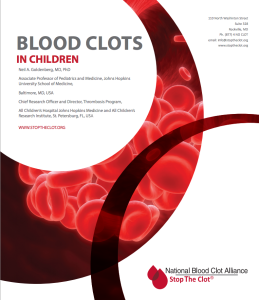How can DVT/PE be prevented in children?
Research shows that anti-clotting medications can safely prevent DVT/PE in many adults in situations of increased risk for developing DVT/PE, such as hospitalization or joint replacement surgery.
For prevention of DVT/PE in children, doctors usually prescribe less intense dosing of anti-clotting medication than is used for treatment of DVT/PE.
In children who were born with a certain type of heart conditions, recent research suggests that DOACs may be useful for preventing DVT/PE and blood clots that occur in the arteries of the body.
For situations that may put a child at increased risk for DVT/PE, other steps that can be taken to help prevent DVT/PE from occurring include:
- Staying well-hydrated and drinking plenty of fluids that have very little sugar or caffeine. (Dehydration increases the risk of DVT/PE.)
- Not smoking or vaping. Smoking damages the inner lining of blood vessels and increase the risk of DVT/PE as well as clots in the arteries of the body.
- Not taking estrogen, such as birth control pills, patches or rings that contain estrogen, if they have had a DVT/PE in the past, or are known to have factor V Leiden or have family members who have developed DVT/PE when they were younger than 50 years old.
- Putting a plan in place with the child’s hematologist (blood doctor) for how to prevent DVT/PE in a child who has a personal or strong family history of DVT/PE or genetic risk factor during situations in which a child’s risk of DVT/PE is increased — including hospitalizations and after certain surgeries. This plan may involve using anti-clotting medication for a short period of time, at a less intense dosing than is used for treating DVT/PE, until the child is back to their usual state of health.
Neil A. Goldenberg, MD, PhD
Professor of Pediatrics and Medicine, Johns Hopkins University School of Medicine,
Baltimore, MD, USA
Chief Research Officer and Director, Thrombosis Program,
All Children’s Hospital Johns Hopkins Medicine and All Children’s Research Institute,
St. Petersburg, FL, USA
Updated: September 2024





